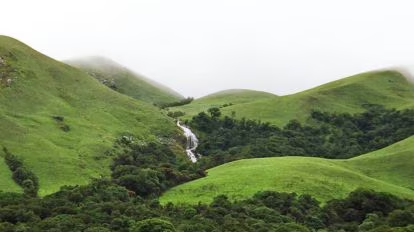Kerala has revised its proposal for Ecologically Sensitive Areas (ESAs) in the Western Ghats, reducing the area to 8,590 sq km. The move comes after devastating landslides in Wayanad, highlighting the urgent need for environmental protection in fragile ecosystems.
Kerala Revises ESA Proposal Following Wayanad Landslides
The Kerala government has submitted a revised proposal to the Union Ministry of Environment, Forest, and Climate Change (MoEFCC), seeking to declare 8,590.69 sq km of the Western Ghats as Ecologically Sensitive Areas (ESAs). The revised figure, covering 98 villages across 12 districts, is 121 sq km smaller than the area proposed earlier in May 2024.
This adjustment follows a series of devastating landslides in Wayanad district in July 2024, which claimed over 400 lives and emphasized the urgency of protecting fragile ecosystems.
Key Features of Kerala’s Revised Proposal
ESA Coverage:
The revised proposal identifies 8,590.69 sq km for protection, covering 98 villages across districts like Wayanad, Idukki, and Palakkad.
Reduction in Area:
Compared to the earlier submission, 121 sq km has been excluded from the new proposal to address concerns from local stakeholders about land-use restrictions in ESA zones.
Focus on High-Risk Zones:
Villages prone to landslides, such as those in Wayanad’s Chooralmala, Mundakkai, and Vellarimala, have been retained in the revised plan.
Why the Western Ghats Need Protection
The Western Ghats, designated as a UNESCO World Heritage Site, are among the world’s most significant biodiversity hotspots. They are home to unique flora and fauna and play a critical role in regulating climate and water cycles.
However, the region faces mounting threats, including:
Deforestation: Widespread clearing of forests for agriculture and development.
Mining and Quarrying: Unregulated activities destabilizing hill slopes.
Tourism Pressure: Unplanned tourism impacting natural habitats.
Protecting the Western Ghats is essential not just for biodiversity but also for mitigating natural disasters like floods and landslides, which have become more frequent due to climate change.
Wayanad Landslides: A Wake-Up Call
The July 2024 landslides in Wayanad district have underscored the urgent need for ecological safeguards. Heavy rains triggered mudslides in Chooralmala, Mundakkai, and Vellarimala, leading to the loss of over 400 lives and extensive damage to property.
These tragic events highlight the vulnerability of the region to extreme weather conditions and the importance of sustainable land management practices.
Challenges in Balancing Development and Conservation
Kerala’s revised ESA proposal aims to balance environmental protection with the socio-economic needs of local communities. While environmentalists emphasize the need for comprehensive conservation, local residents express concerns about potential restrictions on agriculture, construction, and other economic activities.
To address these challenges, the state government has adopted a consultative approach, ensuring that the proposal considers both ecological and human factors.
Union Environment Ministry’s Role
Union Environment Minister Bhupender Yadav informed the Lok Sabha about Kerala’s revised proposal, signaling the central government’s commitment to finalizing the ESA notification. The Ministry is currently reviewing submissions from six states, including Kerala, Gujarat, Goa, Maharashtra, Karnataka, and Tamil Nadu.
The Centre’s sixth draft notification, issued in July 2024, proposed 56,825 sq km of ESA coverage across the Western Ghats. Kerala’s input will play a crucial role in shaping the final notification.
The Road Ahead
Kerala’s revised ESA proposal represents a critical step toward conserving the Western Ghats while addressing developmental concerns. However, the success of this initiative will depend on:
Timely Finalization of the ESA Notification: The delay in implementing the notification has been a longstanding issue.
Community Engagement: Effective communication with local communities about the benefits and limitations of ESA designations.
Sustainable Development Policies: Encouraging eco-friendly tourism and regulated land-use practices.
Kerala’s decision to revise its ESA proposal reflects the growing recognition of the need for urgent action to protect the Western Ghats. As the Union Environment Ministry reviews the submission, the focus remains on achieving a balance between ecological conservation and sustainable development.
The Western Ghats are not just a regional treasure but a national priority, essential for biodiversity, climate stability, and disaster mitigation. The revised proposal, while a step in the right direction, is only the beginning of a broader effort to safeguard one of India’s most vital ecological assets.


Leave a Reply